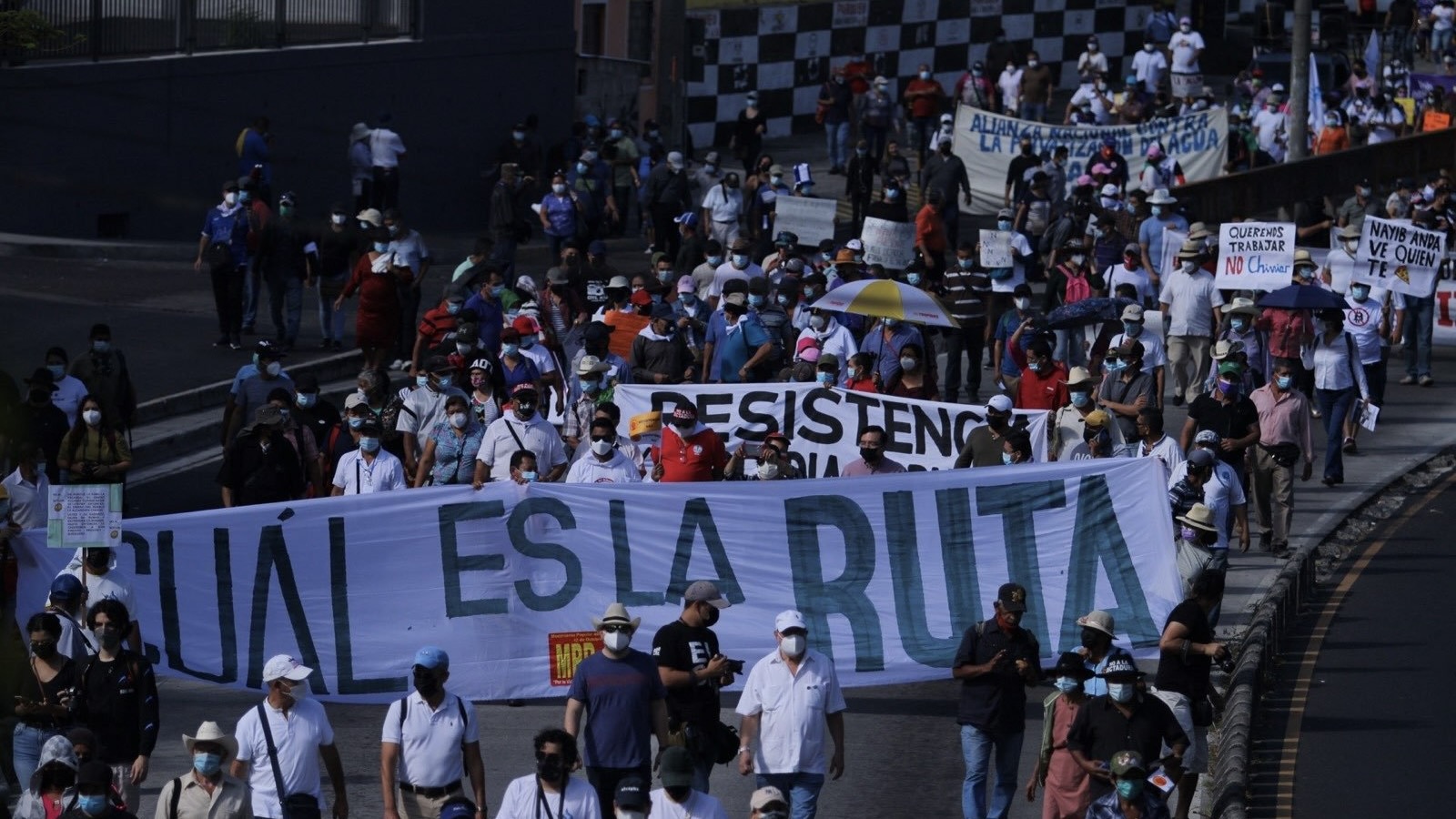On December 12, thousands of Salvadorans once again took to the streets of the capital San Salvador in a protest against President Nayib Bukele and his anti-people policies. Members of various trade unions, social movements, human rights organizations, feminist groups, civil society organizations, as well as legislators and members of opposition parties carried out a peaceful march in rejection of the recognition of Bitcoin as legal tender, the increase in the cost of the basic food basket, the rise in numbers of missing persons in recent months, the alleged acts of corruption orchestrated and permitted by Bukele’s ministers and officials, and the negotiations between the national government and criminal gangs, among other issues.
Despite the government’s plan to obstruct the march, thousands of Salvadorans gathered at the Cuscatlán park and marched to Gerardo Barrios square. Many organizations denounced on social networks, with videos as evidence, that several buses carrying protesters from various municipalities to San Salvador were blocked by hundreds of police and military checkpoints installed across the national territory. They criticized that the passengers were questioned and their cell phones were checked. Various leaders condemned the actions as violation of the right to protest, stemming from the executive’s fear of people’s power.
The march was called for by the Popular Resistance and Rebellion Bloc, a platform that brings together 32 social organizations, movements, and unions. The bloc demanded that Bukele repeal the Bitcoin law, by which he enforced the use of highly volatile cryptocurrency. It also demanded the reinstatement of all the five Supreme Court justices and the attorney general dismissed on May 1 in an attempt to seize the country’s judicial institutions. It requested that the legislators not to approve the reforms to the Constitution promoted by Bukele, especially the ones that endorse presidential re-election, and make it easier for the Supreme Court to transfer or dismiss judges or magistrates.
Vencimos los obstáculos impuestos por el Gobierno y marchamos con orgullo y dignidad para exigir respeto a nuetros derechos humanos, cese a la persecución política y la corrupción, no más impunidad y pactos con criminales, alto a las desapariciones.
El pueblo exige respeto! pic.twitter.com/s39xHIXzvJ— Bloque de Resistencia Y Rebeldía Popular (@Bloque_RP) December 12, 2021
Le temen a que el pueblo manifieste sus exigencias, le temen a la organización, y utilizan los recursos del Estado para amedrentar a la gente. La policía y el ejército tienen un rol, el de proteger, no el de coartar la movilidad para evitar la libertad de expresión.#ElSalvador pic.twitter.com/f8bydhcVxz
— Dina Argueta 🇸🇻 (@DinaArguetasv) December 12, 2021
Human rights organizations and left-wing opposition parties rejected the increase in human rights violations, political persecution, and disrespect for rule of law under Bukele’s administration. They denounced that Bukele’s “dictatorial” policies violate human rights and the country’s Constitution, and put democracy at risk.
Meanwhile, environmental groups protested against a bill that promotes privatization of water in the country, by granting permits to private companies for up to 15 years, with possibility for renewal. The bill is currently being debated in the Legislative Assembly, dominated by the ruling NI-GANA alliance. The organizations are demanding that the government withdraw this bill and present a new bill that guarantees water as a universal human right as well as promotes its responsible management.
Likewise, feminist and LGBTQ+ movements demanded respect for their rights, and condemned the country’s regressive policies on reproductive and sexual rights. They denounced the rise in femicides and homophobic violence.
For his part, Bukele tried to defame and diminish the demonstration. He indicated that only a few people came out to protest. He even suggested that the United States government was behind these protests.
In turn, the organizers and participants of the march, flooded social networks with photos and videos of the multitude that hit the streets using the hashtag #El12Marchamos or #WeMarchedOn12.
Por que Bukele le tiene tanto miedo “3%”
Por cobarde, por inútil, por que tenemos la razón o por que es un cuento que ni el mismo se lo cree? pic.twitter.com/7Vl3weINTr— Samuel Ramirez (@rbsamuel) December 12, 2021
#El12Marchamos pic.twitter.com/b1ytQGreqN
— Roberto Dubon (@Roberto_Dubon) December 12, 2021
Last week, the US Treasury alleged that Bukele’s government secretly negotiated a truce with the country’s powerful gangs in exchange for financial benefits and privileges for their jailed leaders, and imposed sanctions on various Bukele government officials. The decision received support from the leftist Farabundo Martí National Liberation Front (FMLN).
Sunday’s mobilization was the fourth anti-government protest in recent months. Earlier, on September 7, September 15 and October 17, thousands of Salvadorans demonstrated to demand respect for democracy, separation of powers, and repeal of the various high-handed laws and bills.





